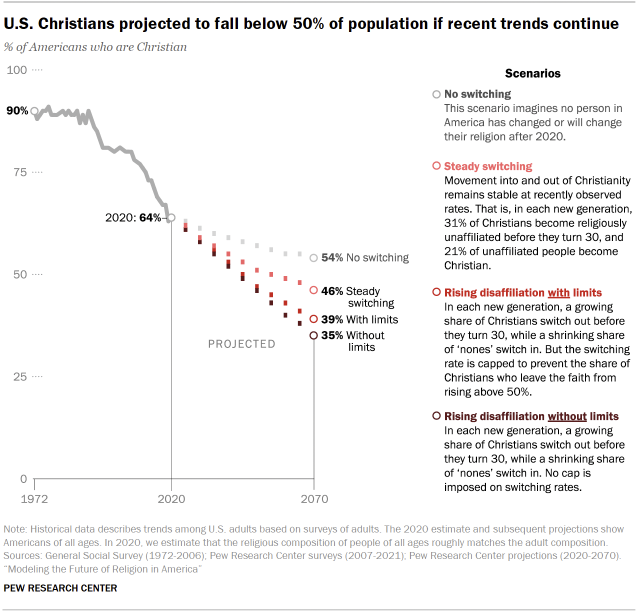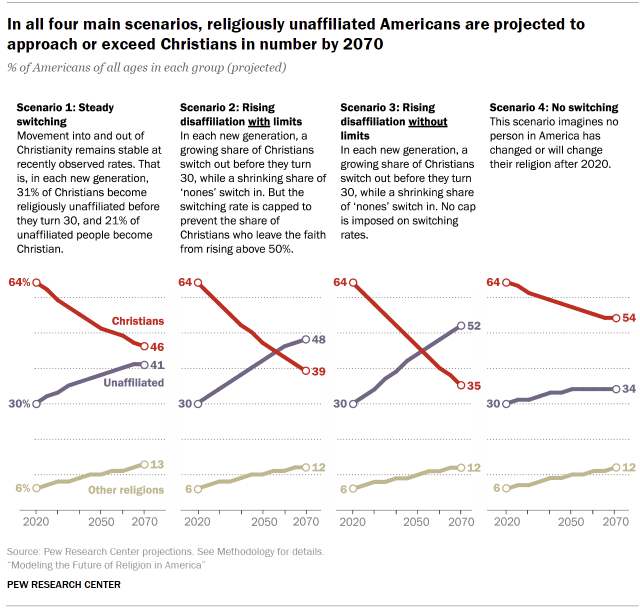Eliza Campbell has been a practising member of the Church of Jesus Christ of Latter-day Saints her entire life. She was born in Utah, a state dominated by the religion, and attended Brigham Young University, a private college owned and run by the church.
“It’s part of your whole professional network, your whole emotional community,” she said. “Basically, it touches every facet of your life.”
Then, two years ago, Campbell quit the church after nearly three decades.
She is one of many Americans who were reared as Christians but are now rejecting the faith.
Decline of America’s Christian majority
As it has been since the nation’s founding, Christianity continues to be the largest religion in the United States, but its numbers are dwindling.
According to a recent Pew Research Center survey, the number of Christians in America has been declining for many years. If current trends continue, Christians may make up fewer than half of the country’s population in a few decades.
According to the analysis, Christians made up nearly 90% of the population 50 years ago, but by 2020 that proportion had fallen to roughly 64%.
“If recent trends in switching [changing one’s religious affiliation] hold, we projected that Christians could make up between 35% and 46% of the U.S. population in 2070,” said Stephanie Kramer, the senior researcher who led the study.
The study simulated four possible changes in religious affiliation and discovered a dramatic decline in Christianity in each scenario.

Although Kramer stated there are several possibilities that could explain this phenomena, the study does not address the issue of why Christians are leaving their faith.
“Some scholars say that it’s just an inevitable consequence of development for societies to secularize. Once there are strong secular institutions, once people’s basic needs are met, there’s less need for religion,” Kramer said.
“Other people point out that affiliation really started to drop in the ’90s. And it may not be a coincidence that this coincides with the rise of the religious right and more associations between Christianity and conservative political ideology.”
The basis of Campbell’s decision to leave was a struggle between her religious beliefs and her own personal identity and ideals.
“For me, especially, when I started to come out as queer, it became impossible for me to reconcile this church that was basically admitting that they wanted kids like me dead or suicidal,” she said. “I decided I had to choose myself and choose my well-being.”
Majority could become “religiously unaffiliated”
The Pew poll also discovered that the proportion of Americans who identify as “religiously unaffiliated” is increasing and may someday surpass the number of Christians in the U.S.
“That’s where the majority of the movement is going,” Kramer said. “We don’t see a lot of people leaving Christianity for a non-Christian religion.”
Religiously unaffiliated people do not necessarily identify as atheists, according to Kramer, who also noted that the word encompasses people who identify as “agnostic,” “spiritual,” or “nothing in particular.”
By 2070, it was predicted that the number of Americans who were religiously unaffiliated would equal or surpass that of Christians in the four scenarios Pew studied. The proportion of people practising other religions was predicted to double at the same time.

Hasan Tauha, a Stanford University student, said of the rising number of religiously unaffiliated persons in the country, “It’s almost what I expect.”
“I don’t think it’s surprising. I think it’s a product of modern comforts. I think when life is good, when it’s better, you know, religion is just not as important.”
Tauha was not a Christian growing up. He was a devoted Muslim for the majority of his life but, four years ago, he made the decision to give up his faith. He now describes himself as an atheist.
Tauha’s process of abandoning his faith, like Campbell’s, entailed breaking away from the religious community he had been a part of his entire life as well as changing his convictions.

